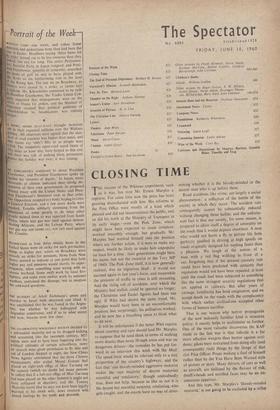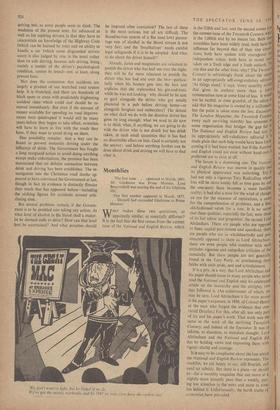CLOSING TIME
HE success of the Whitsun experiment, such I as it was, has won Mr. Ernest Marples a reprieve. For some time now the press has been growing disenchanted with him. His reforms at the Post Office were mostly of a kind which pleased and did not inconvenience the public, and so did his work at the Ministry. of Transport in its early stages--even the Pink Zone, which might have been expected to cause irritation, worked smoothly enough; but gradually Mr. Marples had worked himself into the position where any further action, if it were to make any impact, would be likely to make him unpopular (at least for a time: later generations might bless his name, but not the motorist or the Tory MP of 1960). The Pink Zone itself, it is now generally realised, was an ingenious bluff: it would not succeed again in last year's form, and meanwhile the pressure of traffic in cities is still mounting. And the rising toll of accidents, over which the Ministry had stalled, could be ignored no longer; the Christmas and Easter figures had been too ugly. If Whit had shown the same trend, Mr. Marples would have been in an uncomfortable position; but, surprisingly, his palliatives worked; and he now has a breathing space to think what to dt next.
It will be unfortunate if the better Whit reports about courtesy and care should lead Mr. Marples to suppose that he need think in terms of nothing more drastic than more 50-mph areas and war on dangerous drivers—the remedies he has put for- ward in an interview this week with the Mail. The speed limit would be relevant only to a tiny proportion of the country's highways; and the fact that 'one bloody-minded aggressive motorist makes the vast majority of decent motorists resentful and retaliatory,' though undoubtedly true, does not help, because as like as not it is the decent but resentful motorist, retaliating, who gets caught; and the courts have no way of deter- mining whether it is the bloody-minded or the decent man who is up before them.
Road accidents, like crime, are largely a social phenomenon: a reflection of the habits of the society in which they occur. The accident rate consequently cannot be substantially reduced' without changing those habits; and the unfortu- nate fact is that our society, for some reason, is prepared to allow itself a degree of amorality on the roads that it would deplore elsewhere. A man who would not harm a fly in private life feels perfectly justified in driving at high speeds on roads originally designed for nothing faster than a phaeton. We laugh at the notion of a man with a red flag walking in front of a car, forgetting that if the present casualty rate could have been predicted with certainty that regulation would not have been repealed, at least until the roads had been subjected to something like the same stringent security regulations that are applied to railways. But after years of carnage, familiarity has bred resignation, and we accept death on the roads with the complacency with, which earlier civilisations accepted other forms-of human sacrifice.
That is one reason why horror propaganda of the now tediously familiar kind is mistaken policy; it merely helps to acclimatise us further. One of the most valuable discoveries the. RAF made in the last war is that ridicule is a far more effective weapon than horror against acci- dents; pilots were restrained from doing silly (and consequently rash) things by the image of that clot Pilot Officer Prune making a fool of himself rather than by the You Have Been Warned style of picture or story. Many drivers, of cars as well as aircraft, are titillated by the flavour of risk; death's-heads and terrified faces may be an un- conscious appetiser.
And this type, Mr. Marples's 'bloody-minded motorist,' is not going to be excluded by a stiffer driving test, as some people seem to think. The weakness of the present tests, for advanced as well as for aspiring drivers, is that they have to concentrate on knowledge of the Highway Code (which can be learned by rote) and on ability to handle a car (which some disgruntled drivers assert is also judged by rote in the tests) rather than on safe driving; because safe driving, being mainly a matter of the driver's psychological condition, cannot be tested—not, at least, along present lines.
Nor does the contention that accidents are largely a product of our wretched road system help. It is wretched, and there are hundreds of black spots or areas with predictably frightening accident rates which could and should be re- moved immediately. But even if the amount of money available for spending on road improve- ments were quadrupled it would still be many years before they began to take effect; motorists will have to learn to live with the roads they have, if they want to avoid dying on them.
One possibility remains: that a way can be found to prevent motorists driving under the influence of drink. The Government has fought a long rearguard action to avoid doing anything except make exhortations; the pretence has been maintained that no definite connection between drink and driving has been established. The in- vestigation into the Christmas road deaths ap- peared to have convinced the Government at last, though in fact its evidence is distinctly flimsier than much that has appeared before—including the striking figures for accidents around pub- closing time.
But several problems remain, if the Govern- ment is to be prodded into taking any action. At what level of alcohol in the blood shall a motor- ist be deemed unfit to drive? How can that level best be ascertained? And what penalties should be imposed after conviction? The last of these is the most serious, but all are difficult. The Scandinavian system of a flat (and low) percen- tage rate of alcohol in the blood stream is not very fair; and the 'breathalyser' needs careful legal safeguards if it is to be adopted And what to do about the driver himself?
Already, juries and magistrates arc reluctant to punish the driver who has had one over the eight; they will be far more reluctant to punish the driver who has had one over the two—particu- larly when his hostess gets into the box and explains that she replenished his gin-and-tonic while he was not looking: why should he be sent to gaol alongside the driver who got noisily plastered in a pub before driving home—or alongside burglars and embezzlers? The debate on what shall we do with the drunken driver has gone on long enough; what we need to do now is to think what, if anything, we are going to do with the driver who is not drunk but has drink taken, in such small quantities that it has had no discernible effect on him. Gaol is certainly not the answer: and before anything further can be done about drink and driving we will have to find what is.











































 Previous page
Previous page